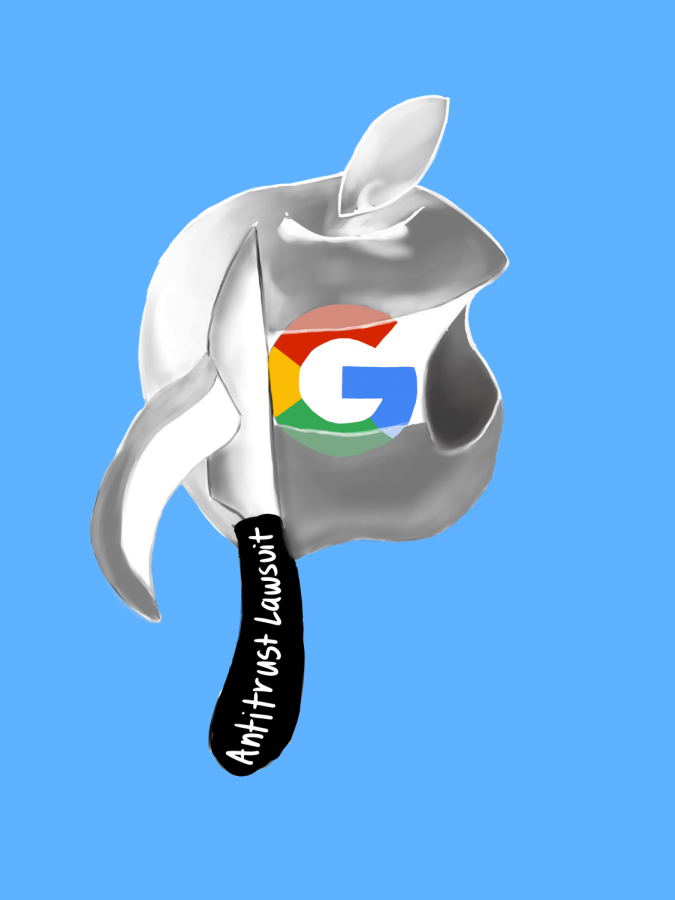Google and Apple’s agreement: Does it break antitrust laws?
Graphic illustration by Sharlene Chen
Google is the default search engine for all Apple devices.
December 9, 2020
The Google logo embedded within the Safari app is a familiar sight for any Apple product user. However, its place on the homepage recently raised concerns about Google paying billions of dollars to be the default search engine on all Apple devices. On Oct. 20, the U.S. Department of Justice (DOJ) filed a lawsuit against Alphabet Inc., Google’s parent company, accusing it of using the yearly agreement with Apple to monopolize the search engine industry.
Context: DOJ vs. Google
According to the lawsuit, Google currently pays Apple between $8 billion and $12 billion per year to make sure Google is the default search engine for Apple users. The DOJ has assessed these payments and determined that they make up between 17% and 26% of Apple’s revenue. Google also significantly benefits from this partnership, since nearly half of its search traffic comes from Apple devices. Additionally, when Apple users search on Google, they are exposed to ads and other Google products such as YouTube, both huge contributors to Google’s profit. The Justice Department is making the case that this deal serves as an unethical means to subtly make Google the core of consumers’ online lives. However, there are consumers who don’t believe that is the case.
“I don’t think the agreement between Apple and Google is harmful,” senior Shasta Narayanan said. “People may argue that this ‘winner takes all’ strategy hinders innovation and causes greater economic inequality, but this negativity ignores humans’ limitless capacity to desire more, and thus create more products and services we never knew we wanted. ”
Antitrust laws are a set of federal and state government laws that regulate the conduct of companies, and are intended to promote competition. There are three primary antitrust laws: the Sherman Act of 1890, the Clayton Act of 1914 and the Federal Trade Commission Act of 1914. Both the Sherman Act and the Clayton Act were passed in order to eliminate participation in anticompetitive practices and allow the government to take legal action against companies that it believes are weakening economic competition. There does not currently appear to be a remedy for effectively breaking the companies’ agreement. In the lawsuit, the Justice Department has only said that it suspects a violation of the Sherman Act.
Current relevance of the lawsuit
Google handles 92% of the world’s internet searches, and much of that success is from its ongoing deal with Apple. Its complete domination of the industry has prompted many to believe the agreement itself was an unethical business practice since it is slowly allowing for the monopolization of the search engine market, and, as a result, breaks these antitrust laws.
Though Apple and Google’s agreement has existed since the iPhone was first released in 2005, the government has only recently decided to challenge it. One explanation for this is that the deal raised a flag when it increased from $1 billion per year to between $8 billion and $12 billion per year in 2014, likely a result of Apple’s user base growing in population and value. Others believe the sudden lawsuit was raised because of conflict caused by tensions that boiled over from a combination of this year’s harsh politics and an ongoing skepticism of large tech companies and their intentions. More specifically, there may be lingering concern from Facebook’s controversial data collection and breach that sparked doubt in consumers.
“It’s the rising tide, the rising sentiment in the political, social and media sphere that have all come together, and the Trump administration wanted to be able to have this lawsuit filed before the election,” said Larry White, Professor of Economics at NYU’s Stern School of Business.
The DOJ’s case
Some say the agreement manipulated Apple users into using Google as the default search engine. Although users do have the choice of switching to another search engine, most do not realize that there are other options available. Since Apple does not let users select search engines during initial device setup, changing the search engine requires a conscious effort to venture into the Settings app and find the correct toggles—a hassle most simply don’t have the time for. Many consumers argue that by making it the default, it conditions its users to become so comfortable with Google’s interface that changing would become an inconvenience that would limit their productivity, leading to Google becoming a necessity.
“I probably would not change my search engine even though I now know that it is possible because I do not feel that it is worth taking the time to do so,” junior Kristin Zhao said. “At this point, I’ve gotten so accustomed to having Google be the default on my devices that it would take a while to get used to a different [search engine] anyway.”
Google’s defense and public statement
On Oct. 20, 2020, Google addressed the lawsuit publicly. In its defense, it claimed that switching search engines is a simple process, and their success is purely because people prefer their service over others. Google’s public statement went on to describe in detail the process of changing one’s default search engine, even providing screenshots for guidance.
“Yes, like countless other businesses, we pay to promote our services, just like a cereal brand might pay a supermarket to stock its products at the end of a row or on a shelf at eye level,” Kent Walker, Google SVP of Global Affairs, said in the company’s public statement. “But let’s be clear—our competitors are readily available too, if you want to use them.”
Antitrust regulation
For tech and social media giants, antitrust law violations have only recently become an issue. As the laws were originally written for the oil, steel and railroad industries over a century ago, some argue that they are outdated, while others believe that the laws are still applicable to tech conglomerates.
In the past, antitrust laws had always been focused on whether the consumer had suffered financial damage. When companies like Google and Facebook offered their services for free, there was no immediate problem, which allowed the companies to grow without any restriction. However, this freedom has now made it difficult to determine and prove the exact effect of these companies’ profits on the economy, and as a result, many complained that the companies’ should warrant more scrutiny.
Privacy concerns
As these companies have gone unchecked for so long, it is becoming increasingly evident that consumers often have little to no control over the way companies are using their data, bringing a multitude of concerns into question, one of which being Apple and Google’s partnership. Apple supposedly strongly advocates for consumer privacy, but its partnership with Google allows its users’ data to also be accessed by Google. While they aren’t directly responsible for Google’s controversial use of data, by making Google the default search engine, they are providing Google the means to continue their practices.
Effectiveness of the lawsuit
Although there is a basis for the lawsuit, many people wonder whether the government would realistically be able to end Apple and Google’s longstanding agreement at all. It is only natural that the current most powerful company in the search engine industry is willing to pay so much for one of the largest user-bases in the world, Apple device users. Even if the government forcibly terminates the contract, it may be signed again since no other company can compete with Google’s offer.
“The monopolist [Google], as a natural part of the bidding, is willing to pay more for that valuable piece of real estate [Apple’s users], because it’s protecting its monopoly profits,” White said. “Whereas any challenger is only willing to pay up to the level of the duopoly, the competitive profits. How do you prevent that from happening? If you’re not going to change the competitive structure of the search engine market, if you’re not going to make the overall structure more competitive, if Apple is going to remain as the dominant firm, then Google’s going to outbid everybody else for that spot.”
Apple and Google’s options for the future
To solve the controversy, Apple could purchase another search engine, such as DuckDuckGo, a search engine focused on privacy, much like Apple itself. It could still increase advertising revenue for Apple, though not as much as Google, while still aligning with Apple’s privacy ideals. However, the move would greatly antagonize Google, since terminating their agreement would cost Google billions of dollars in advertising revenue. As a result, Google could choose to revamp its efforts to make a better Pixel or Android system to compete directly with Apple’s dominance in the U.S. cellphone market. The logical play for both companies seems to be sticking with their current situation, unless the government is able to force them to look for other options.




































































